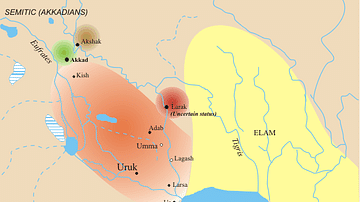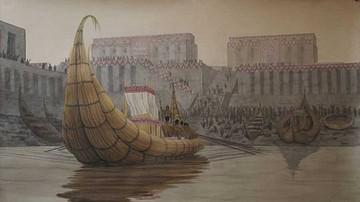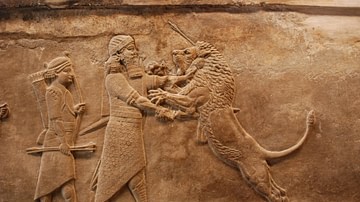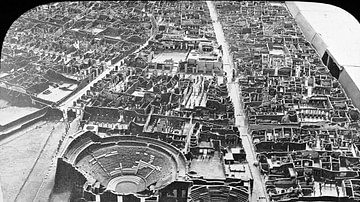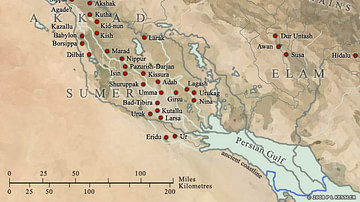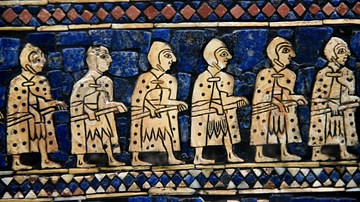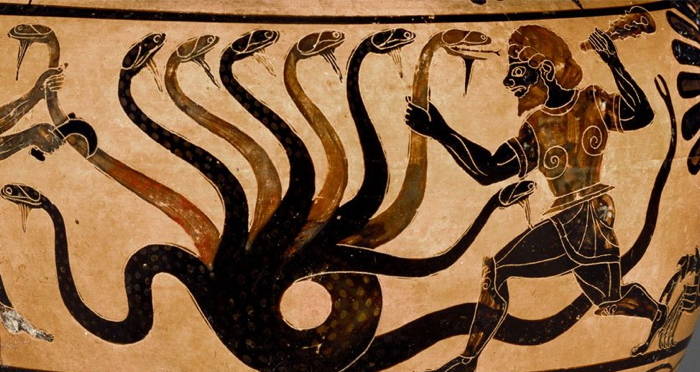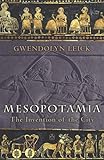Mesopotamia: The Rise of the Cities
Article
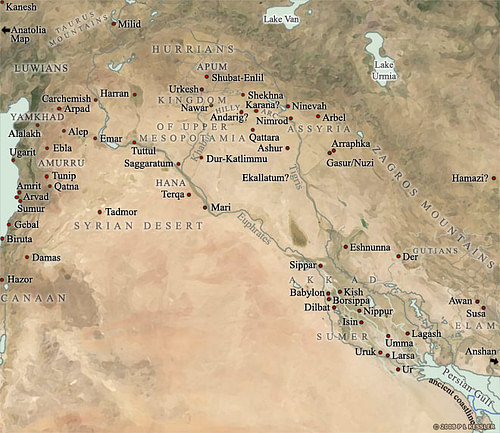
Mythological Origins
This marshy area, hemmed about by hard land and sand dunes, represented to the people the life-giving force of the god and provided a physical manifestation of the order their god had created from chaos; the sweet waters of life were celebrated at Eridu as they were associated with what the Sumerians called the abzu, the primordial source of all existence, the realm in which the gods lived and from which they emerged
The god Enki came forth from the abzu and dwelt at Eridu, and The Sumerian King-list states, “After kingship had descended from heaven, kingship was in Eridu.” This cultural centre became the first city to the Sumerians. The historian Gwendolyn Leick writes:
Thus the Mesopotamian Eden is not a garden but a city, formed from a piece of dry land surrounded by the waters. The first building is a temple…This is how Mesopotamian tradition presented the evolution and function of cities, and Eridu provides the mythical paradigm. Contrary to the biblical Eden, from which man was banished forever after the Fall, Eridu remained a real place, imbued with sacredness but always accessible (2).
Eridu was not only the first city in the world to the Sumerians, but the beginning of civilization. Every other city ever raised, they believed, had its origin in the sand and waters which surrounded Eridu.
Modern Theories
Modern scholars disagree on why the first cities in the world rose in the region of Mesopotamia instead of elsewhere. Theories range from the ancient alien hypothesis to social or natural upheavals that forced people to band together in urban centers, to environmental concerns and even to forced migration of rural communities to cities. None of these theories are universally accepted while the ancient alien hypothesis is rejected by every reputable scholar. What is agreed upon, however, is that the moment the ancient Sumerians of Mesopotamia decided to engage in the process of urbanization, they changed the way humans would live forever. The historian Kriwaczek writes:
This was a revolutionary moment in human history. The [Sumerians] were consciously aiming at nothing less than changing the world. They were the very first to adopt the principle that has driven progress and advancement throughout history, and still motivates most of us in the modern times: the conviction that it is humanity’s right, its mission and its destiny, to transform and improve on nature and become her master (20).
This principle Kriwaczek refers to is perhaps no more than the natural inclination of human beings to gather together for safety from the elements, or it could have its roots in religion and communal religious practices which, among the benefits they offer, provide an assurance that there is order and meaning behind the seemingly random events of life. The historian Lewis Mumford claims that “the habit of resorting to caves for the collective performance of magical ceremonies seems to date back to an earlier period, and whole communities, living in caves and hollowed-out walls of rock, have survived in widely scattered areas down to the present. The outline of the city as both an outward form and an inward pattern of life might be found in such ancient assemblages” (1). Whatever it was that first gave rise to the development of the cities in Mesopotamia, the world would never be the same. Kriwaczek writes:
The Rise of Uruk
The concept of the city, first manifested in the construction of Eridu, did not remain bound by that area for long. Urbanization spread across the region of Sumer rapidly beginning in c. 4500 BCE with the rise of the city of Uruk, today considered the world’s first city. It may well be that Eridu is in fact the world’s first city, as the Sumerian myths maintain, but Eridu was founded c. 5400 BCE, long before the advent of writing (c. 3000 BCE), and, by that time, Uruk was long established and had created and discarded numerous artifacts which, in the present day, attest to its size and population and so substantiate the claim that Uruk is the world’s first city. The site of Eridu, on the other hand, provides little to suggest it was ever any more than a sacred centre, perhaps even defined as a large village or town by modern-day standards of scholarship.
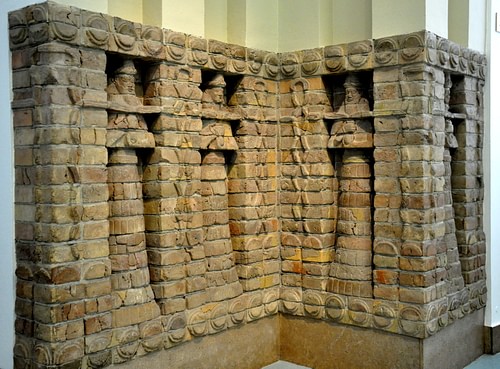
Uruk & Eridu in Mythology
Sumerian mythology supports the contention that Uruk superseded Eridu in the poem Inanna and the God of Wisdom. In this work, the goddess Inanna, whose home is in Uruk, goes to Eridu to visit her father Enki. Kriwaczek notes,
Mesopotamians recognized Enki as the god who brings civilization to humankind. It is he who gives rulers their intelligence and knowledge; he `opens the doors of understanding’…he is not the ruler of the universe but the gods’ wise counsellor and elder brother…Most importantly, Enki was the custodian of the meh, which the great Assyriologist Samuel Noah Kramer explained as the `fundamental, unalterable, comprehensive assortment of powers and duties, norms and standards, rules and regulations, relating to civilized life’ (30).
At the beginning of the poem, Inanna says “I shall direct my steps to Enki, to the Apsu, to Eridu, and I myself shall speak coaxingly to him, in the Apsu, in Eridu. I shall utter a plea to Lord Enki” indicating clearly that she wants something from her father. Enki seems to be aware of her coming and instructs his servant to make her welcome, to “pour beer for her, in front of the Lion gate, make her feel as if she is in her girl-friend’s house, make her welcome as a colleague.” Inanna sits down to drink beer with her father and, as they become progressively more drunk together, Enki offers his daughter one meh after another until she has over a hundred. Enki then seems to pass out from the drinking and Inanna, with the meh, hurries from Eridu back toward Uruk. When Enki wakes and finds he has lost his meh, he sends his servant Isimud to get them back. The rest of the poem relates Isimud’s futile attempts to keep Inanna from reaching Uruk with the meh. She succeeds in bringing “the Boat of Heaven to the Gate of Joy” at Uruk, and “Where the boat came to dock at the quay, she named that place with the name White Quay” to commemorate her triumph. The poem has been interpreted to render, in symbolic form, the transfer of power and prestige from the city of Eridu to Uruk.
Archaeological Evidence
This version of events, of course, comes from Sumerian mythology but there has existed, since serious excavations began in the mid-19th century CE, ample evidence to suggest that there is some historical truth behind the poem. Eridu did seem to decline as Uruk rose in prestige, even though the older city always remained a sacred centre and place of pilgrimage.
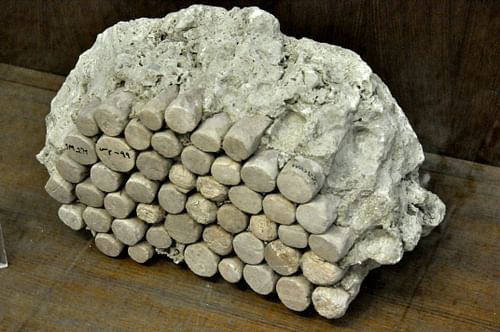
As further archaeological excavations have proceeded in the Near East, however, scholars have come to question whether the traditional view of urbanization beginning in Sumer and spreading north can still be considered valid. The discovery of the settlement of Tell Brak (in modern day Syria), founded c. 6000 BCE, seems to some scholars to suggest that the Urban Revolution may have begun in the north and that the claim that it originated in Sumer has only been accepted because the Sumerians invented writing and so their version of history is accepted as truth and, of course, because the earliest excavations of the 19th century CE were in Sumer.
While the settlement at Tell Brak is older than Eridu, the question of where cities first rose is best addressed by defining what is meant by a `city’ in ancient times. Professor M.E. Smith of Arizona State University writes:
The earliest large urban settlement was Tell Brak in the dry farming zone of northern Mesopotamia. During the Uruk period (3800-3100 BCE) this city consisted of a central zone of public architecture surrounded by sprawling suburban settlement over 1 square kilometer in extent. At the end of this period, the site declined and the focus of urban development shifted to southern Mesopotamia (The Sage Encyclopedia of Urban Studies, 24).
The problem with this assertion, however, is that it fails to address the definition of `city’. Was Tell Brak a `city’ or a large town or village? Professor George Modelski of the University of Washington maintains that it was not a city and bases his claim on the 1987 CE work of the historian Tertius Chandler, Four Thousand Years of Urban Growth. Chandler claims that an ancient city should be defined by the size of its population. Modelski writes, “One important estimate concerns Uruk, that on the basis of the work of Robert Adams (1967, 1981), as the largest city of the very early period” (3). Tell Brak, according to his definition of a city, would be regarded as more of a settlement since the population does not seem to have been great enough to qualify it as an urban centre. This, of course, is a modern method of determining what is and is not a `city’ and there is no way of knowing how the ancient Mesopotamians would have defined the entity of the city or how they regarded a settlement such as Tell Brak.
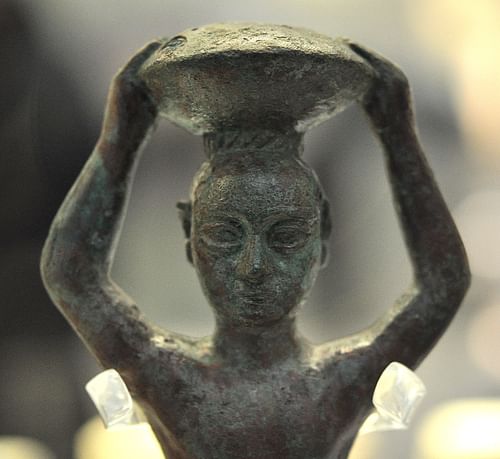
Sumerian Origin
What is certain, however, is that, for whatever reason, the Urban Revolution began in Mesopotamia and, it seems certain, in the region of Sumer. The earliest cities mentioned are Eridu, Bad-tibira, Larak, Sippar, and Shuruppak all of which are located in Sumer. Regarding the various theories as to why Sumer and not elsewhere, Kriwaczek writes that some scholars
see the emergence of civilization as an inevitable consequence of evolutionary changes in human mentality since the end of the last ice age…But we humans aren’t really like that; we don’t react so unthinkingly. The actual story would have to allow for the everlasting conflict between progressives and conservatives, between the forward and backward looking, between those who propose `let’s do something new’ and those who think `the old ways are best’, those who say, `let’s improve this’ and those who think `if it ain’t broke, don’t fix it’. No great shift in culture ever took place without such a contest (21).
Once upon a time, in the land known as Sumer, the people built a temple to their god who had conquered the forces of chaos and brought order to the world. Those people then continued the work of their god and established order throughout the land in the form of the city. The answer to the question of why it happened in Mesopotamia instead of elsewhere can best be found in considering the culture of that particular society. The people of Mesopotamia, regardless of the region or ethnicity, shared the common concern with establishing and maintaining order and, because of their religious beliefs, a near-obsession with control of the natural world. It should not be surprising, then, that such a culture would have been the first to conceive of and construct the urban entity which most completely separates human beings from their natural environment: the city.
Bibliography
- Bertman, S. Handbook to Life in Ancient Mesopotamia. Oxford University Press, 2003.
- Hutchinson, R. The SAGE Encyclopedia of Urban Studies. SAGE Publications, 2009, 24-28.
- Kramer, S.N. History Begins at Sumer. University of Pennsylvania Press, 1988.
- Kriwaczek, P. Babylon: Mesopotamia and the Birth of Civilization. Thomas Dunne Books, 2010.
- Leick, G. Mesopotamia: The Invention of the City. Penguin Books, 2002.
- Mesopotamia: Iraq, A Country Study, Helen Chapin Metz, 1988Accessed 1 Dec 2016.
- The Natural History of Urbanization by Lewis Mumford, 1956Accessed 1 Dec 2016.
Translations
We want people all over the world to learn about history. Help us and translate this article into another language!
About the Author
Support Our
Non-Profit Organization
World History Encyclopedia is a non-profit organization. For only $5 per month you can become a member and support our mission to engage people with cultural heritage and to improve history education worldwide.
Cite This Work
APA Style
Mark, J. J. (2014, April 10). Mesopotamia: The Rise of the Cities. World History Encyclopedia. Retrieved from https://www.worldhistory.org/article/678/mesopotamia-the-rise-of-the-cities/
Chicago Style
Mark, Joshua J.. “Mesopotamia: The Rise of the Cities.” World History Encyclopedia. Last modified April 10, 2014. https://www.worldhistory.org/article/678/mesopotamia-the-rise-of-the-cities/.
MLA Style
Mark, Joshua J.. “Mesopotamia: The Rise of the Cities.” World History Encyclopedia. World History Encyclopedia, 10 Apr 2014. Web. 22 Jun 2021.

